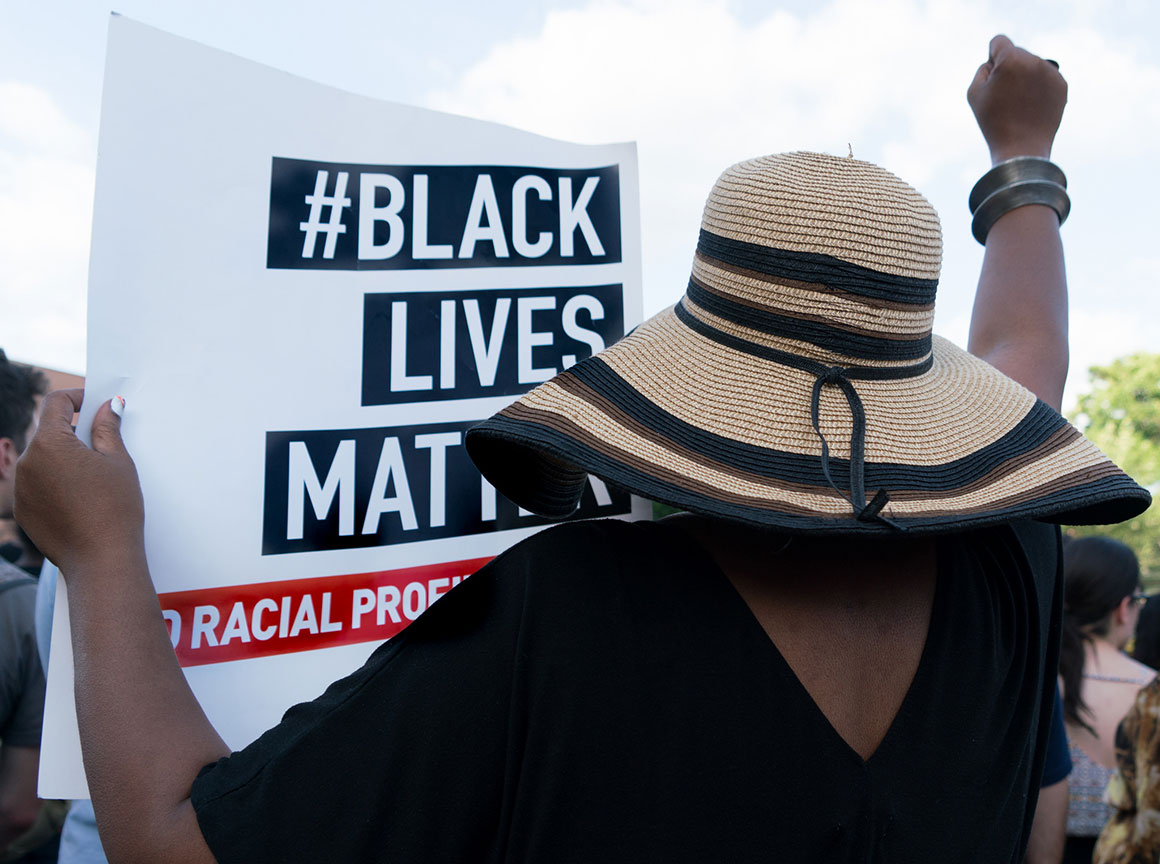
MediaJustice, et al. v. Federal Bureau of Investigation, et al.
What's at Stake
On March 21, 2019, the ╠ęūė╩ėŲĄ and MediaJustice, formerly known as "Center for Media Justice," filed a Freedom of Information Act lawsuit seeking records about FBI targeting of Black activists. The lawsuit enforces the ╠ęūė╩ėŲĄand MediaJusticeŌĆÖs right to information about a 2017 FBI Intelligence Assessment that asserts, without evidence, that a group of so-called ŌĆ£Black Identity ExtremistsŌĆØ poses a threat of domestic terrorism. The Intelligence Assessment was widely disseminated to law enforcement agencies nationwide, raising public concern about government surveillance of Black people and Black-led organizations based on anti-Black stereotypes and First Amendment protected activities.
Summary
In August 2017, the FBIŌĆÖs Counterterrorism Division issued a secret Intelligence Assessment that claimed the existence of ŌĆ£Black Identity Extremists Likely Motivated to Target Law Enforcement OfficersŌĆØ (ŌĆ£AssessmentŌĆØ) and labeled the group a new domestic terror threat. The Intelligence Assessment was disseminated to more than 18,000 law enforcement agencies across the country and was subsequently leaked to the press. The document contains troubling revelations about the FBIŌĆÖs targeting of Black people for surveillance, investigation, and prosecution based on unsupported allegations about a fictitious group of so-called ŌĆ£Black Identity Extremists.ŌĆØ
The Intelligence Assessment asserts, without evidence and based on flawed logic, that six isolated incidents of violence against police officers by Black people purportedly demonstrate the existence of a shared ideology motivating violence against law enforcement. It wrongly groups together Black people who, in the FBIŌĆÖs own words, ŌĆ£perceive[ ] racism and injustice in American societyŌĆØ and have beliefs about ŌĆ£Black identity.ŌĆØ
The Intelligence Assessment also reveals the FBIŌĆÖs focus on First Amendment protected beliefs, activity, and associations in determining who is a so-called ŌĆ£Black Identity Extremist,ŌĆØ including through social media surveillance. Since its disclosure, some law enforcement leaders have openly acknowledged that no group of ŌĆ£Black Identity ExtremistsŌĆØ even exists.
The FBIŌĆÖs creation of a ŌĆ£Black Identity ExtremistŌĆØ threat label is the latest example in a sordid history of efforts to harass, discredit, and disrupt Black activists who advocate against white supremacy and racial injustice.
At the turn of the Twentieth Century, law enforcement targeted Ida B. Wells and Marcus Garvey as ŌĆ£race agitators.ŌĆØ In the 1950s and 1960s, the FBIŌĆÖs notorious Counterintelligence Program deployed covert activities against Martin Luther King, Jr., the Southern Christian Leadership Conference, the Student Nonviolent Coordinating Committee, the Black Panther Party, el-Hajj Malik el-Shabazz (previously known as ŌĆ£Malcolm XŌĆØ), and Ella Baker. In the late 1960s and 1970s, the FBI surveilled and investigated Black-owned bookstores on the grounds that the stores were purportedly centers of extremism.
In 2018, the ╠ęūė╩ėŲĄand the MediaJustice filed a Freedom of Information Act request for information about why the ŌĆ£Black Identity ExtremistŌĆØ threat designation was created, how it is being used, and whether it is leading to illegal surveillance of Black people and Black-led organizations. As a Black-led organization and the nationŌĆÖs largest racial-justice network for media and technology rights, access, and representation, the MediaJustice represents organizations vulnerable to FBI surveillance under the ŌĆ£Black Identity ExtremistŌĆØ label.
UPDATE (6.12.20):
In the course of our litigation, the FBI has repeatedly represented that there are approximately one million pages of investigative records potentially responsive to our request consisting of both open and closed investigations.
Additionally, in response to multiple congressional inquiries, the FBI recently stated that it is no longer using the ŌĆ£BIEŌĆØ designation but is instead lumping alleged violence attributed to Black activists with the broader category of ŌĆ£Racially or Ethnically Motivated Violent ExtremismŌĆØ (RMVE), which includes white supremacist violence. Because we know there are still active investigations of Black people on the basis of purported shared ideology, we can assume that the new ŌĆ£RMVEŌĆØ category includes active investigations of Black people.
In order to gain more information on the use of the newer RMVE categories and the continued investigations of Black people based on First Amendment protected activity, we submitted a new FOIA request regarding the FBIŌĆÖs development and use of its new terms ŌĆ£Racially Motivated Violent Extremists,ŌĆØ ŌĆ£Racially Motivated Extremists,ŌĆØ ŌĆ£Racially or Ethnically Motivated Violent Extremists,ŌĆØ and ŌĆ£Racially or Ethnically Motivated Extremists.ŌĆØ
View the Freedom of Information Act records
In response, the FBI is keeping critical information secret without any valid justification and has even refused to search for entire categories of records. Nor has there been any sign that the FBI has retracted its flawed ŌĆ£Black Identity ExtremistŌĆØ threat label despite calls to do so from the Congressional Black Caucus and some law enforcement.
The complaint, MediaJustice v. Federal Bureau of Investigation, was filed in the U.S. District Court for the Northern District of California. It cites violations of the Freedom of Information Act. The ╠ęūė╩ėŲĄof Northern California is co-counsel.
Legal Documents
-
03/21/2019
CMJ and ╠ęūė╩ėŲĄOriginal FOIA Request to FBI -
03/21/2019
CMJ and ╠ęūė╩ėŲĄFOIA Appeal -
06/12/2020
Media Justice and ╠ęūė╩ėŲĄFOIA Request
Date Filed: 03/21/2019
Court: FOIA Requests to the FBI
Affiliate: Northern California
Date Filed: 03/21/2019
Court: FOIA Requests to the FBI
Affiliate: Northern California
Date Filed: 06/12/2020
Court: FOIA Requests to the FBI
Affiliate: Northern California
-
03/21/2019
Complaint -
-
03/21/2019
Complaint - Exhibit A -
03/21/2019
Complaint - Exhibit B -
03/21/2019
Complaint - Exhibit C -
03/21/2019
Complaint - Exhibit D
Complaint - Exhibit ADate Filed: 03/21/2019
Court: District Court (N.D. Cal.)
Affiliate: Northern California
Complaint - Exhibit BDate Filed: 03/21/2019
Court: District Court (N.D. Cal.)
Affiliate: Northern California
Complaint - Exhibit CDate Filed: 03/21/2019
Court: District Court (N.D. Cal.)
Affiliate: Northern California
Complaint - Exhibit DDate Filed: 03/21/2019
Court: District Court (N.D. Cal.)
Affiliate: Northern California
-
03/21/2019
Date Filed: 03/21/2019
Court: District Court (N.D. Cal.)
Affiliate: Northern California
